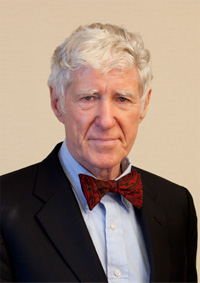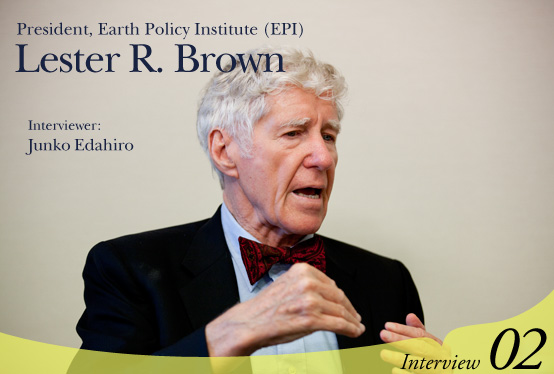- Junko :
- I have many more questions, but I think the time is running out. So here are my two last questions. One is to ask for your input or guidance for our new institute. We are looking at the relationships between well-being and happiness, economy and society, in order to create a truly sustainable society. What kind of studies can we do to create real change?
- Lester :
- One of the ideas I have is this. About this time last year, I was in China for the Chinese edition of my book Plan B 4.0. It suddenly occurred to me in looking at problems in China, that many of those problems are the results of their trying to imitate western industrial economies. And it occurred to me it would be exciting and fun to ask ourselves a question. "If we were designing an economy today for the 21st century, not the 20th or the 19th, but for the 21st century, what would it look like?" "What would life be like in that economy?" The answer would have to take into account land scarcity, water scarcity, carbon emissions, and a whole series of things that would lead to a very different sort of economy than we have today.
- So maybe it is now time in the 21st century to stop emulating the economies of the 19th (coal) and 20th centuries (oil), and start fresh. Start with a fresh note pad and ask, "What kind of an economy do we want today?" You can just call it designing an economy for the 21st century for the conditions that now exist and we know will be existent in the decades ahead. Once you say it this way, the issues are suddenly very sensible. Why not design an economy for the 21st century? That is where we are. This is where we live. We are not living in the 20th century or the 19th century anymore.
- Junko :
- Right. That's a very good challenge. Thanks.
- Junko :
- My second question is what makes you happy? You have been working in this field for many years. Actually the issues don't seem to be getting any better. But always you look happy. How do you do it?
- Lester :
- (Laughs.) Well, it's hearing reports of progress actually and doing the sort of things I know I have to do if we are going to save civilization that keeps me going. For example, about a month ago, David Cameron, the Prime Minister of the UK, said, "We are going to cut our carbon emissions 50 percent by 2025." That is more ambitious than any countries have done to date.
- Our goal with Plan B at the Earth Policy Institute is to cut carbon emissions 80 percent by 2020. Now 50 percent by 2025 is not the same, but it is a big step in a right direction.
- And we have some smaller countries like Costa Rica and Maldives planning to be carbon-free within a decade, by 2020 or so. Again they are small countries. The UK is a much larger industrial country. Scotland said that by 2020 all their electricity will be carbon free, for example.
- Junko :
- I see.
- Lester :
- Suddenly we are beginning to see not incremental, marginal changes, but quantum jumps. We see Iceland wanting to export geothermally-generated electricity because it has a huge amount of geothermal energy, to Europe, for example. Or we have 46 countries that have now stabilized their populations. They contain roughly a billion people. Japan is one of those. Almost every country in western and Eastern Europe, including Russia, has now more or less stabilized their population. That's progress. We still have a big way to go, but China and the United States are not that far away. Once they do, that will be a big part of the world.
- It is this evidence of progress, moving toward a civilization that can be sustained, that I find most exciting and also gratifying.
- Junko :
- Thank you for speaking with us today.
Lester R. Brown
Founder and President of Earth Policy Institute
http://www.earth-policy.org/

He has been described by the Washington Post as "one of the world's most influential thinkers" and as "the guru of the global environmental movement" by The Telegraph of Calcutta. The author of numerous books, including World on the Edge, chapters, articles, etc., he helped pioneer the concept of environmentally sustainable development. His principal research areas include food, population, water, climate change, and renewable energy. The recipient of scores of awards and honorary degrees, he is widely sought as a speaker. In 1974, he founded Worldwatch Institute, of which he was President for its first 26 years. In 2001, he left Worldwatch to found the Earth Policy Institute. For relaxation, Lester runs. Read a complete biography. View a selected list of recent publications by Mr. Brown.
- Earth Policy Institute
- http://www.earth-policy.org/





